This step by step diy woodworking project is about a 24×48 wooden pavilion roof plans. This is PART 2 of the large pavilion, where I show you how to build the 6:12 pitched roof. This pavilion is the perfect addition to your property, especially if you want to do lots of outdoor activities. Take a look over the rest of my woodworking plans, if you want to get more building inspiration. Premium Plans for this project available Here. Check out the Shop, as well, for full list of Premium Plans.
When buying the lumber, you should select the planks with great care, making sure they are straight and without any visible flaws (cracks, knots, twists, decay). Investing in cedar or other weather resistant lumber is a good idea, as it will pay off on the long run. Use a spirit level to plumb and align the components, before inserting the galvanized screws, otherwise the project won’t have a symmetrical look. If you have all the materials and tools required for the project, you could get the job done in about a day.
Projects made from these plans
How to Build a Gable Roof for a Large Pavilion
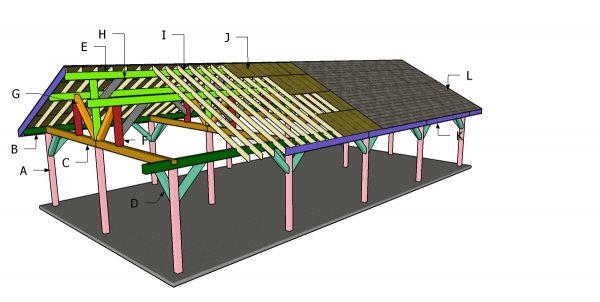
24×48 pavilion plans – building
Materials and Cut List
Tools
![]() Hammer, Tape measure, Framing square, Level
Hammer, Tape measure, Framing square, Level
![]() Miter saw, Drill machinery, Screwdriver, Sander
Miter saw, Drill machinery, Screwdriver, Sander
Time
Related
- PART 1: 24×48 Pavilion Plans
- PART 2: 24×48 Pavilion Roof Plans
Fitting the braces to the pavilion
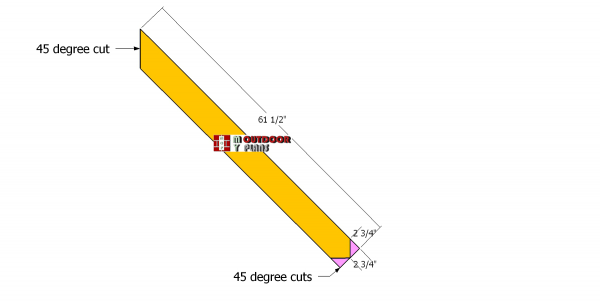
Ridge-beam-braces
Next, we need to make the diagonal braces for the pavilion structure. Use a miter saw to make the 45 degree angle cuts to both ends, as shown in the diagram.
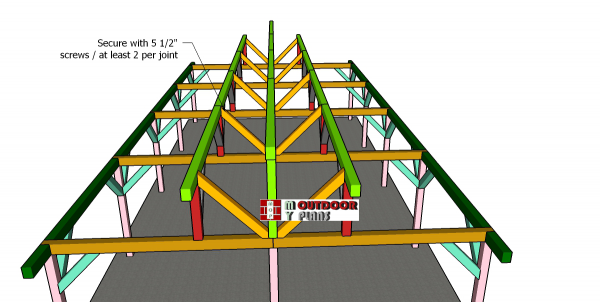
Fitting-the-diagonal-braces—top-beams
Plumb the supports with a spirit level and then attach the braces. Drill pilot holes and insert 5 1/2″ screws to lock the braces into place. Use at least 2 screws for each joint.
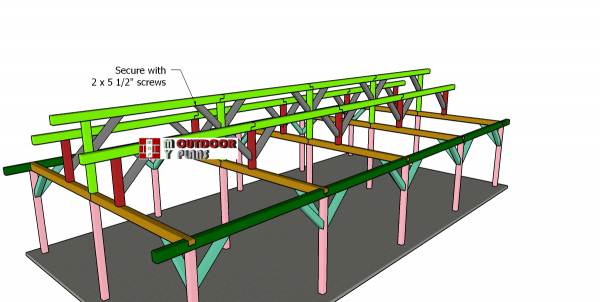
Fitting-the-braces-to-ridge-beam
Continue the project by attaching the side braces, so you make the whole structure really sturdy. Make 45 degree cuts at both ends of the braces and then secure them into place with 5 1/2″ screws.
How to build a large pavilion roof
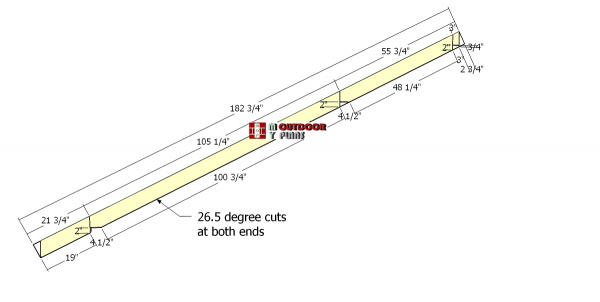
Rafters-for-24×36-pavilion
First of all, we need to build the rafters for the gable roof. Use 2×6 lumber for the rafters. Use a miter saw to make the cuts to the boards. Smooth the edges with sandpaper. Make the notches to the rafters, as shown in the plans. Mark the lines before doing the cuts. See the diagram for more details on how to make the notches to the top of the rafters.
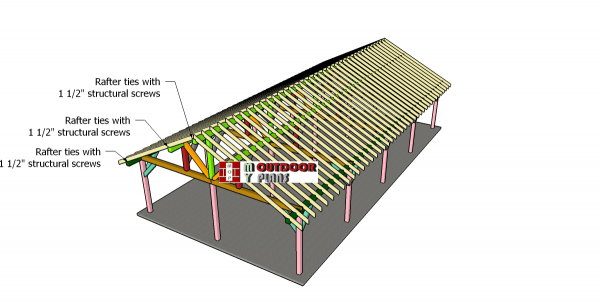
Fitting-the-rafters—connectors
Fit the rafters to the top of the pavilion, using the information from the diagram. It is important to space the rafters properly (every 16″ on center), otherwise you won’t be able to attach the roofing sheets. Use rafters ties to lock the rafters to the beams, at both ends. Use 1 1/2″ structural screws for the rafter ties.
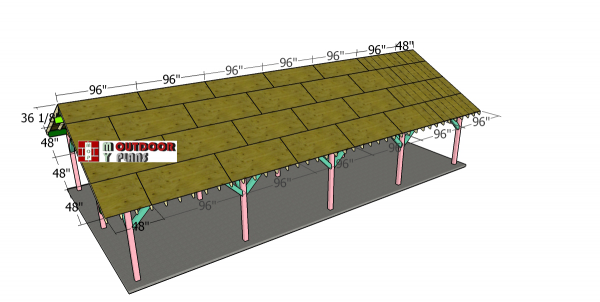
Fitting-the-roof-sheets—24×48-pavilion
Use 1/2″ plywood for the roof decking, as well. Cut the sheets at the right dimensions and then lay them to the top of the pavilion. Leave no gaps between the sheets and then insert 1 5/8″ screws, every 8″ along the rafters, so you can secure them into place tightly.
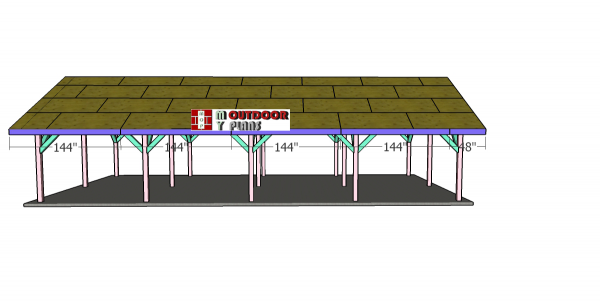
Fitting-the-side-trims
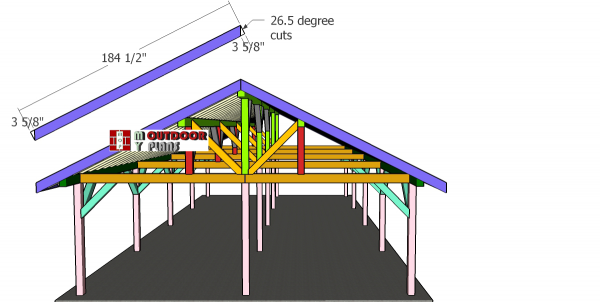
Fitting-the-gable-trims
Fit 1×8 trims to the sides of the pavilion. Align the edges with attention and insert 2″ nails to lock them into place tightly. Fit the 1×8 trims to the front and back of the pavilion. Lock them into place with 2″ nails.
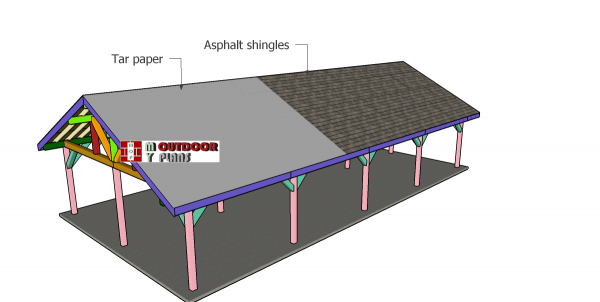
Fitting-the-roofing
Cover the roof with tar paper and then install the asphalt shingles. Start installing the shingles from the bottom of the roof up to the top. Make sure you also install the appropriate drip edges around all edges of the roof, so you can seal the shed roof. Read the manufacturer’s instructions for a tight fit.
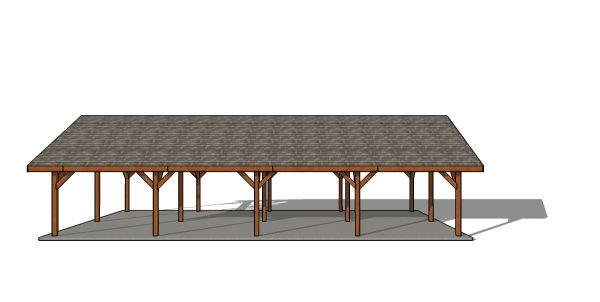
24×48 pavilion plans – side view
Last but not least, you need to take care of the finishing touches. Therefore, fill the holes with wood putty and then smooth the surface with 120-220 grit sandpaper. Apply a few coats of paint / stain to enhance the look of the pavilion and to protect them from the elements.
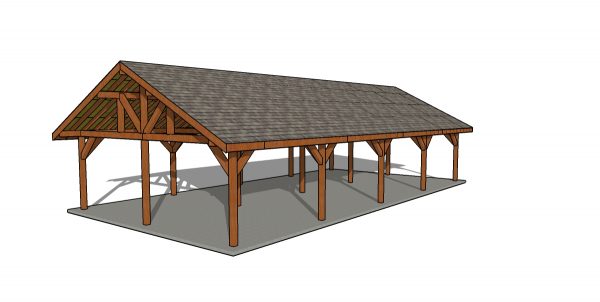
24×48 pavilion plans
Don’t forget to take a look over PART 1 of the project, so you learn how to build the frame of the large pavilion. This pavilion is sturdy and it features a very elegant design that puts and emphasis on cost efficiency and durability. You can add railings to the exterior of the pavilion. See a list with all my plans, sorted by category, HERE.
This woodworking project was about 16×48 backyard lean to pavilion roof plans. If you want to see more outdoor plans, check out the rest of our step by step projects and follow the instructions to obtain a professional result.





